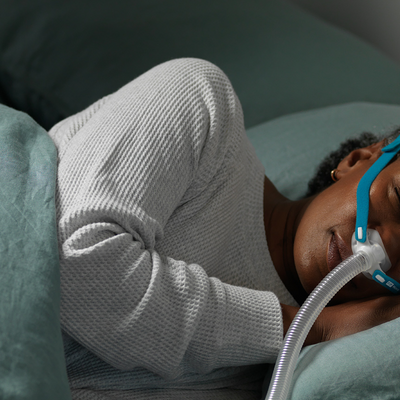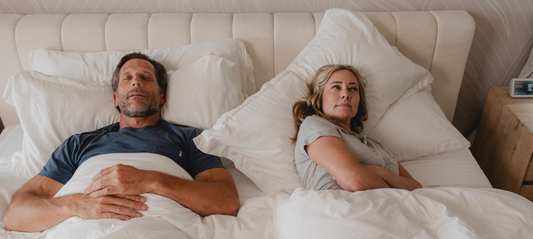Written by Nancy Kirk
April 16, 2024
Most people know sleep apnea affects sleep quality and short-term and long-term health: Sleep apnea reduces one's ability to feel focused and energized each day, and it increases the risk of disease, from heart problems to obesity to diabetes.
Less commonly discussed is sleep apnea’s relationship with your mental health. The unfortunate truth is that undiagnosed sleep apnea has been linked to low life satisfaction, depression, and anxiety.
Even after getting diagnosed, some people may face anxieties about using CPAPs for the first time. Luckily, there are solutions to feeling stressed or down due to sleep apnea. Here are the implications of sleep apnea on your mental health, and helpful ways to mitigate its effects.
How Sleep Apnea Affects Your Brain
According to the Centers for Disease Control and Prevention, people should get at least 7 hours of sleep each night. However, achieving this recommended amount can be challenging for those with sleep apnea.
Sleep apnea involves repeated breathing disruptions throughout the night, often leading to severe sleep deprivation. Despite spending 8 hours in bed, people with untreated sleep apnea may feel as if they haven’t slept at all. Severe cases can cause more than 30 breathing interruptions per hour, drastically reducing your true sleep time.
These frequent interruptions in breathing reduce oxygen levels in the brain, known as hypoxia. Hypoxia impairs the brain's ability to perform critical functions, like clearing harmful toxins and maintaining neural connections. Over time, this can result in cognitive decline and decreased brain tissue volume, affecting memory and problem-solving skills. This can also trigger inflammation and stress in the brain, which are linked to serious neurological conditions like stroke, Alzheimer’s, depression, and more.
Untreated sleep apnea not only makes sufficient sleep nearly impossible but also has profound implications for both mental and physical health. This is why it’s so crucial to get tested for sleep apnea.
Mental Side Effects of Untreated Sleep Apnea
- Increased Risk of Brain Disorders: The lack of restful sleep may lead to an increased risk of depression, Alzheimer’s, stroke, and more.
- Anxiety: Many individuals experience heightened stress due to chronic sleep disruption and the health concerns associated with sleep apnea.
- Irritability and Mood Changes: Sleep deprivation often results in irritability, short temper, and significant uncontrollable mood fluctuations.
- Cognitive Impairment: Memory issues, difficulty concentrating, and impaired judgment are common mental side effects due to decreased oxygen to the brain during sleep episodes.
- Mental Fatigue: Chronic fatigue from sleep apnea can affect your mental alertness and enthusiasm for daily activities.
- Social Withdrawal: Some people might withdraw socially due to these emotional effects, which can impact personal and professional relationships.
Studies on Sleep and Happiness
A recent study by researchers at Montana State University in Bozeman analyzed the past 50 years of research on poor sleep and its effects on mental health. Researchers found that study participants who experienced poor sleep repeatedly reported feeling more anxious, sad, angry, and mentally exhausted. When those same subjects returned to an average amount of sleep, they saw a dramatic improvement in mood.2
The Science Behind Sleep and the Brain
When you experience deep sleep, your brain can “cleanse” itself of the toxic buildup that causes harmful mental disorders. While your in harmful proteins, such as beta-amyloid, the protein associated with Alzheimer’s.3
If you are experiencing less deep sleep — also known as slow-wave sleep — you’re more likely to develop dangerous brain disorders like Alzheimer's, Parkinson’s, or depression.
Because sleep apnea reduces your body’s ability to experience deep sleep, many scientists believe untreated sleep apnea can increase your risk of these brain disorders.
Coping with Sleep Apnea and Mental Health
Getting sleep apnea treatment is a step toward a more fulfilling life with less stress and more balanced moods. By addressing sleep apnea, you not only improve the quality of your sleep but also enhance your overall mental well-being.
Regular, uninterrupted sleep can significantly reduce stress levels and boost your mood, making you feel more positive and energetic throughout the day. Additionally, effective sleep apnea treatment can lead to better cognitive function and a greater sense of emotional stability, allowing you to enjoy a more relaxed and joyful life. As your body and mind rejuvenate nightly, you'll be better equipped to handle life's challenges with a clear, focused mind.
Overcoming CPAP Anxiety
It’s relatively common for some new users of CPAP therapy to experience anxiety about using their machine, which may be perceived as bulky or loud. The truth is, wearing your mask may take some getting used to, but once you experience the endless health benefits CPAP therapy provides, you’ll be surprised you ever lived without it.
If you experience anxiety around wearing your CPAP, start by familiarizing yourself with the machine and trying the mask on during the day. It's also helpful to adjust your sleeping environment to make it as comfortable and soothing as possible. Use white noise or soft background music to mask the sound of the machine. If you’re having trouble adjusting, you aren’t alone! At Lofta, our team can help provide tailored strategies to address your needs. Remember, the short-term challenge of adapting to CPAP therapy pales in comparison to the long-term health benefits it brings.
How to Talk About CPAP With New Partners
Part 1: Anxiety & Advice About CPAP | CPAP Couples]
Discussing CPAP use with a new partner might seem daunting, but it can be a simple conversation that helps deepen your relationship. Start by choosing a relaxed and private moment when you both have time to talk without interruptions. Consider bringing it up casually when discussing daily routines or health habits. Explain what your CPAP is and why you use it. Emphasize the benefits, like improved energy and mood, which contribute positively to your daily life and by extension, your relationship.
Listen to any questions or concerns they might have. Some people aren’t familiar with CPAP machines, how they work, or what they mean for their health. It's also helpful to address any misconceptions or worries they might have, such as noise from the machine or how it looks. This conversation is about informing and building intimacy and trust by sharing aspects of your life that affect your well-being.
For more tips, read A Couple’s Guide to Conquering Sleep Apnea.
Ease Your Travel Worries Related to Sleep Apnea
Traveling with a CPAP machine when you have sleep apnea doesn't have to be cumbersome. With some planning, you can easily maintain your nightly routine and enjoy your travels without interruption.
Pack an Extension Cord and Adapter Plug:
Depending on your accommodation, you may need an extension cord. Also, if traveling internationally, ensure you have the appropriate adapter plugs for your CPAP machine.
Bring a Backup Power Solution:
Consider packing a CPAP battery pack, especially if you're venturing somewhere where power interruptions are expected or if you plan to be outdoors. It's also a helpful backup in case of an unexpected power outage.
Bring Your CPAP in Carry-On:
Always remember to carry your CPAP as a carry-on when flying to prevent the risk of it getting damaged or lost if checked. Most airlines don’t count CPAPs toward your carry-on allowance. It can also be helpful to use a travel bag designed for CPAP machines so you can neatly store your machine, mask, tubing, and accessories in one spot.
The Mental Benefits of CPAP Therapy
CPAP therapy has been shown to offer significant mental health benefits. It helps in restoring a regular sleep pattern while significantly improving your mental health by offering a more clear, focused, and balanced mindset. These benefits include:
- Improved Mood: Patients often experience a reduction in symptoms of depression and anxiety after starting CPAP therapy, thanks to improved sleep quality and oxygen levels.
- Sharpened Focus: By ensuring a more stable sleep pattern, CPAP therapy can help improve memory, attention, and problem-solving skills.
- Increased Energy and Motivation: Better sleep helps unlock higher energy levels throughout the day and enhanced productivity.
- Less Stressful Episodes: Improved sleep quality helps regulate mood swings and emotional responses, making it easier to cope with challenges.
Prioritize Your Sleep Health Today
Focusing on your sleep health is more than ensuring restful nights; it's about leading a more energetic and fulfilling life.
If you feel fatigued with low moods and you think you may have sleep apnea—we strongly recommend getting tested. Sleep apnea is more common than you might think, affecting an estimated 39 million people in the U.S. alone.4
Click here to order an at-home sleep test, and we’ll send your test straight to your door. You take the test from the comfort of your own bed, and all your appointments are done completely virtually! We’re here for you every step of the way.
Whether you need advice from a Lofta sleep expert or want to improve your nightly routine with a new-and-improved CPAP mask, achieving more satisfying sleep can lead to a more enjoyable life.
SOURCES:
1. Are You Getting Enough Sleep?, Centers for Disease Control and Prevention https://www.cdc.gov/sleep/features/getting-enough-sleep.html
- Unhappy or anxious? How you sleep may be the cause, CNN https://www.cnn.com/2023/12/21/health/sleep-mental-health-wellness/index.html
- Why Sleep Is Important for Brain Health, American Brain Foundation https://www.americanbrainfoundation.org/why-sleep-matters-for-brain-health/
-
Sleep Apnea Statistics and Facts You Should Know, National Council on Aging
https://www.ncoa.org/adviser/sleep/sleep-apnea-statistics










































